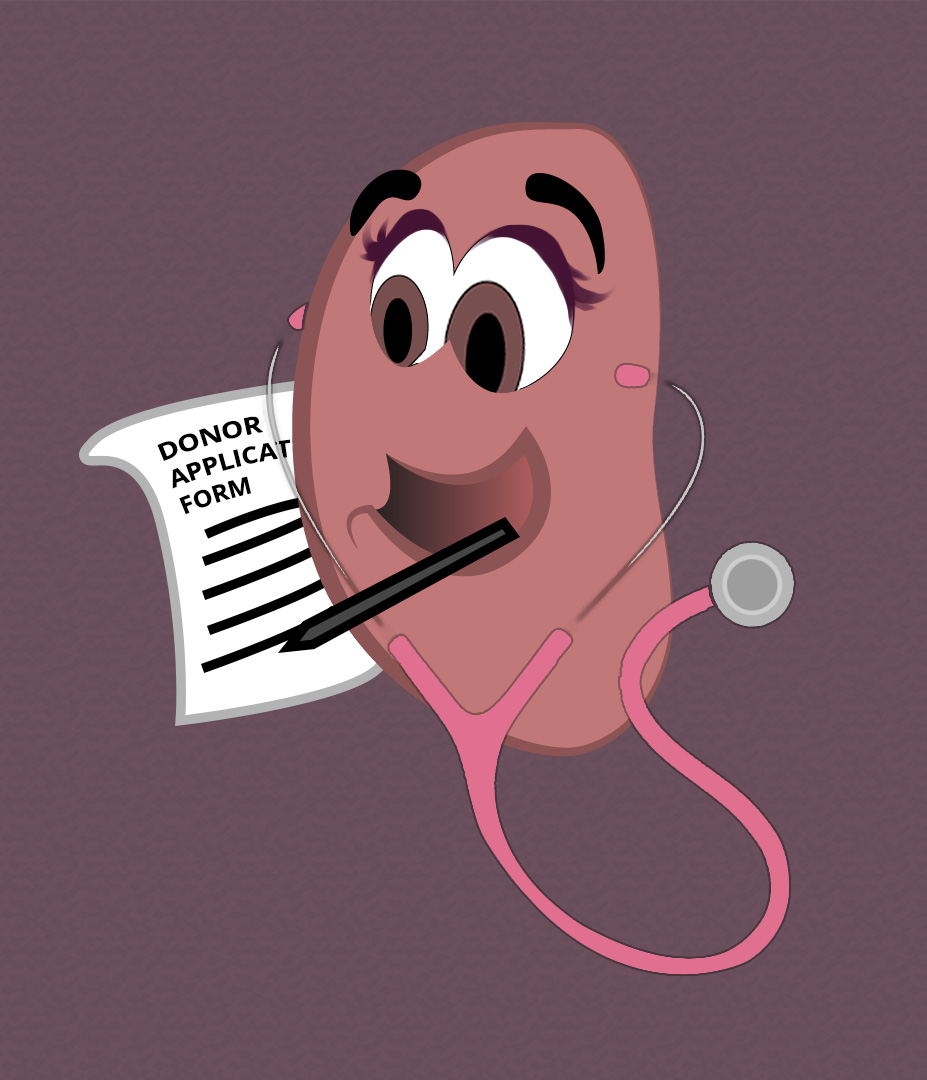Steps Toward Getting a Transplant
Getting a kidney transplant can be a lengthy process. It is very important for the patients (and relatives) to attend a local education session. This will provide insight on:
- Risks and Benefits of a Kidney transplant
- The wait times for both a living and deceased donor
- What to expect in the pre-transplant workup
- What immunosuppression is and what its side effects may be
- The importance of being complaint to the medications and the follow up visits
Step One: Find a donor
There are two types of organ donors: a living donor and a non living or deceased donor.
- Living Donor: Choses to donate one of their kidneys by surgical removal
- Deceased Donor: Allows usable organs to be donated at their death.
A thorough pre-transplant work up will be done which includes a medical, surgical and psychosocial assessment. This will include checking your blood group, HLA type and do a cross match to help increase the chances of a successful transplant.
Patients get referred to a kidney transplant center from their Nephroogist office directly or from a dialysis center. Early referral is key and is done when your eGFR is < 20 ml/min. This gives patients ample time to identify a potential living donor. Living donors may be related or unrelated. This is the treatment of choice for patients with End Stage Kidney Disease. If you have a potential donor, please make your transplant team aware. The donor will also undergo a thorough medical evaluation to protect their own health.
If you don’t have a potential living donor, you will be placed on a waitlist for a cadaver or deceased donor. After your workup if complete and the transplant center has decided you are a good candidate. This requires registration with United Network of Organ Sharing (UNOS) and varies in each state.
If you know someone who would like to donate a kidney please visit with the National Kidney Registry to start the progress.
Step Two: Complete the Pre-Transplant Workup and Get on the Waitlist
Once you are referred to a transplant center the initial assessment will begin. You will be examined thoroughly to ensure that you qualify and are a good candidate. This entails a battery of tests with a check list of investigations. They will also pose questions such as:
- Do you have a condition in which a transplant would be contraindicated (i.e. cancer)?
- Are you fit to undergo surgery?
- Will you tolerate long term immune-suppression?
The assessment will be done by a team which includes a Nephrologist, Transplant Surgeon, nurses and coordinators. A medical, surgical and social assessment will be done. Once complete the patient may be placed on the waitlist and register you with United Network of Organ Sharing (UNOS).
Step Three: The Transplant Surgery
Your native kidneys are not removed unless there is an indication to do so. The kidney transplant along with an attached artery and ureter is placed in the lower abdominal quadrant. The renal artery is connected to a larger artery to provide blood to your transplant and the ureter is attached to your bladder. Many different techniques have been developed over the years.
Occasionally the kidney starts to make urine right away and other times it takes longer requiring more support (Semites even dialysis briefly) before it starts to work. You will stay in the hospital until your new kidney is working and you are in good shape to go home with close follow up by the transplant team.
Step Four: Monitor for Complications
In the initial period after you get the transplant you are monitored for any post surgical complications such as infection, bleeding or graft rejection. Subsequently you are also monitored for side effects of the immunosuppressive medications.
Step Five: Caring for Your Kidney
Health maintenance becomes vital after a transplant. This will help to get the most number of years out of your new kidney. This includes close physician follow up and compliance with your medications.
Are there any post-op concerns I should have?
You’ll be in the hospital for 3-5 days as your doctors monitor your recovery, run blood and urine tests, and so on.
Anti–rejection medication has to be taken for the rest of your life. Your immune system doesn’t realize how awesome your new kidney is, so like any foreign object, your body will try to get rid of it. It’s in your best interest to not let this happen, so don’t forget to take your meds.
You’ll Need to Keep an Eye On…
Blood Pressure
Hypertension isn’t a joke. Keep an eye on your BP levels to avoid complications!
Diabetes Risk
Also a high risk factor, and can be a complication of one of the transplant medications
Anti-rejection medication levels
Take them every time, on time! They only work at a certain dosage and can be monitored through blood work
Cancer Risk
Stay up to date on screenings
Which doctor will take care of me after I get the kidney?
The KT center will watch you in the beginning and schedule follow ups for the first 3 months after your operation.
If you are a dialysis patient or have advanced CKD and want to see if you are a candidate for a KT, call Dr. G! She will be happy to discuss options for you and provide a referral to a transplant center.
If you already had a KT, Dr. G would be happy to be your monitoring physician and provide guidance going forward in taking good care of your new kidney.
Book an appointment: (714) 435 • 0150



